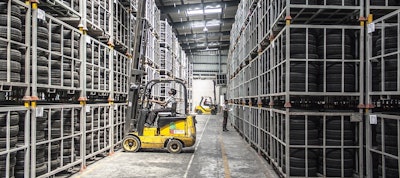
The number one reason workers leave a company is because of company culture, not money, said Andy Paulson, director of customer success from labor management system company TZA. At ProMat/Automate on April 11, he and TZA President Andrew Recard presented familiar data about how to attract today’s workers. They highlighted some of the gaps between what warehousing and logistics companies are offering and what workers want, as well as giving an example of how one company reduced turnover.
Today’s workers want to be well-compensated, and they’re also determined to make sure their company culture aligns with their ethics. Amazon raised its wages to a minimum of $15 per hour for all employees, and large-scale operations like Amazon and Tesla are making themselves competitive with their pay. Sometimes smaller companies need to pay higher in order to compete, even as the idea threatens their bottom line.
Recard pointed out that this conversation isn’t new, but is more at the forefront than before. Millennial workers like to be rewarded, he said, but those rewards aren’t always tangible — sometimes, they’re common sense management.
“Treat them well, take care of them, engage them, make sure they’re happy, make sure they’re productive,” Recard said. Workers want coaching, feedback, and recognition. “This is not an option anymore,” he said. “This is something people are demanding.”
Where labor management in manufacturing and warehousing might once have been about finding the people who aren’t productive and bringing them up to speed, more companies are finding now that they get better results by fostering their best people. One company TZA cited set up conversations between employees and their manager once a month, with the goal of making sure that each employee was in the role which best suited them. Managers were encouraged to ask whether employees like what they’re doing, have any interest in cross-training, or aspire to a leadership position.
Other companies have shifted to more creative tangible rewards—Recard pointed out a major manufacturing company which puts workers who have perfect attendance between Thanksgiving and Christmas into the running for a $10,000 lottery. But is that worth the cost of working over the holidays? Employees with children or close families might not think so.
Attracting millennial workers may be difficult because of the perception of manufacturing and warehousing work as boring, unskilled, or difficult. Common causes of high turnover in industry are ineffective management, little to no recognition or reward for valued employees, undesirable work environments (dirty, hot/cold), and weekend and holiday work. Finding ways to avoid these things as well as keeping up with an increasingly high-speed, high-demand environment may be a challenge for companies.
Generation Z employees may be even more determined to avoid these things than Millennials. According to TZA, Generation Z employees are very accustomed to changing jobs at intervals and highly value meaningful interpersonal interactions.
“We’ve have to take care of the people we do have, because there are not ten people in line who are going to show up,” Paulson said.
With a low population growth rate and more jobs than workers, companies need to treat their people well in order to ensure loyal employees.























